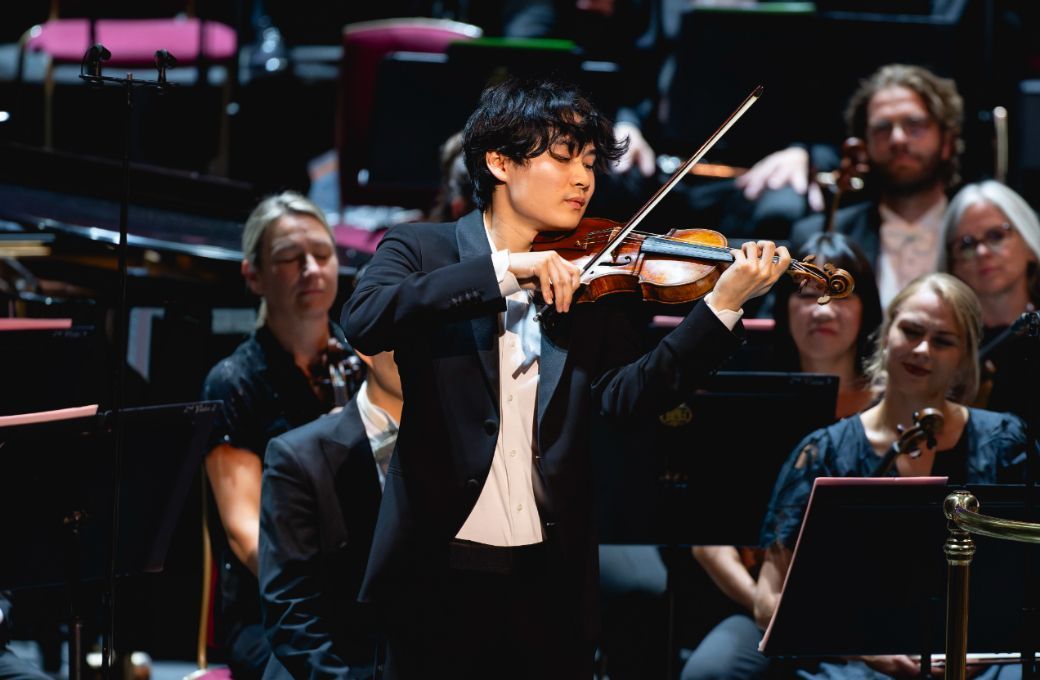Although the Debutantes’ Ball long ago disappeared from the social calendar, an unusual version of it was given at the Royal Albert Hall, with three Proms Debut Artists taking to the stage. Conductor Marie Jacquot was resplendent in her versatility, revealing a talent for engaging collaboration with both the orchestra and the soloists; violinist Inmo Yang sported a Guarneri del Gesù with which he thrilled a full house; and Rachel Mahon opened up the hall’s organ to release a glowing ball of solar intensity. It was also the debut of composer Augusta Holmès and her symphonic poem Andromède. The host for the evening was the BBC Symphony Orchestra, as grand and elegant as Beau Brummel and a byword for cultured entertainment.
The all-French programme offered a Provençal excursion, a Spanish sojourn, an ancient Green adventure and a Cook’s Tour of a double-barrelled imagination. For Bizet’s L'Arlésienne, the orchestra set off at a brisk pace, in happy-go-lucky-mood, stopping here and there to taste the air. However, the scene soon darkens with the mournful, yearning voice of Martin Robertson’s alto sax – a reverie overtaken by the jollity of carousing peasants. Just when a stern chorus of strings threaten to spoil the party along comes the marvellous sounds of the Marcho dei Rei, the clang of bells swelling hearts and lifting spirits. Jacquot was clearly enjoying herself.
Yang then gave a dazzling, energetic performance of Sarasate’s Carmen Fantasy, revelling in the explosion of details with which the piece is adorned. His bouncing pizzicati ricocheted around the hall, a flight of harmonics soared into the dome and the Seguidilla taunted with its rhythmic brashness. With that, and his encore (a Kreisler scherzo), Yang signed-up a new cohort of followers, including me.

Andromède revealed itself to be a highly-colourful evocation of the dramatic rescue of the eponymous princess by the dashing Perseus, the gadabout with a flying horse who deprived Medusa of her capital assets. The piece opened in grand style with the evocation of the mighty sea-god Poseidon, an angry old man, magnificently rendered by the brass. As the narrative unfolded there was ample evidence of Holmès’ gift for orchestral writing. Her handling of musical space is excellent, with a fine sense of harmonic movement; the big tune depicting the amorous union of the lovers is as steamy as the scene demands. The coup de grâce was the tenderness of the closing bars depicting not the joy of rescue from a monstrous fate but the transformation of the heroine to a place amongst the stars. Hopefully we can rely on Jacquot to give us more of Holmès’ pieces since, on the evidence of this performance, she knows how to lift them off the page with style.
As for the double-barrelled imagination, that belongs to Saint-Saëns whose Symphony no.3 in C minor, “Organ Symphony” was the main course at the ball. The French aren’t renowned for their symphonies but this one has secured a firm place in popular imagination, its main tune inspiring (if that is the right word) a 1970s pop song. Jacquot gave a clear-eyed interpretation, eliciting terrific playing from the orchestra; the strings were simply superb. In the slow movement was a little becalmed, but the impetus was regained with the tremendous energy of the finale. Here Mahon’s playing matched the brilliance of the orchestra and she had the last word of the night; the intensity of the organ’s sound overlaid that of the orchestra, not to drown it, but enriching the magnificent glow.


